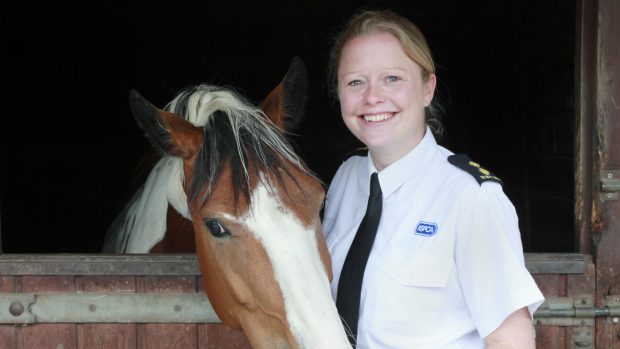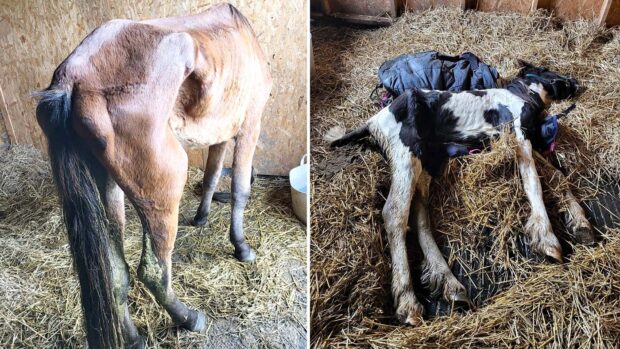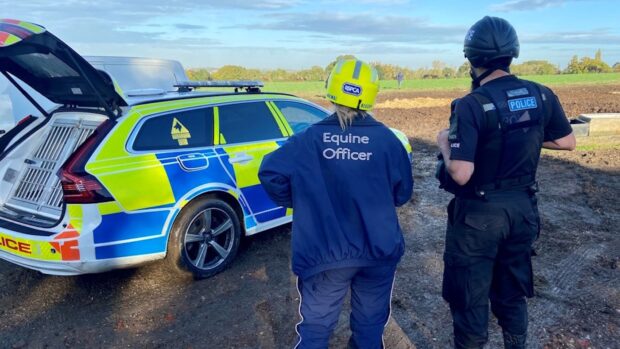The government is to address “best practice” on tethering following a debate at parliament yesterday (20 February).
MPs raised concerns about the risk of neglect and welfare issues in tethered horses at the adjournment debate in the House of Commons.
MP Luke Hall, who opened the debate, said as tethered horses can be moved quickly it is “virtually impossible” to monitor their welfare.
“This debate follows the Break the Chain campaign run by the excellent HorseWorld trust, a leading equine rescue charity in the southwest, just next door to my constituency,” he said. “The Break the Chain campaign aims to amend the Animal Welfare Act 2006 to include restrictions on the tethering of horses.
“We are seeing horses being tethered all across the country, potentially leaving them open to neglect, cruelty and abuse, and potentially posing a danger to the people around them, too.
“Tethering is not deemed enough of a breach of the Animal Welfare Act to allow horse charities to intervene. A tethered horse also does not have the freedom to interact with its own species, as the Act says it should. Leaving horses isolated has been shown to increase stress levels and stress-related hormones, which can cause them to display stereotypical behaviours that cause physical and psychological harm.”
Mr Hall added that long-term tethering is in “direct conflict” with legislation.
“In many instances authorities have not felt that the Animal Welfare Act is strong enough grounds to rescue [tethered] horses, despite the obvious suffering. It is therefore my belief, and the belief of the charity that initiated this campaign, that the Act needs to be amended to state explicitly what constitutes inappropriate tethering,” said Mr Hall.
Parliamentary under-secretary for Defra David Rutley responded to say the aim of the government’s work in this area is to “hightlight that tethering should be for the short term”.
“I should clarify that tethering is not a banned activity, as there are circumstances in which tethering may avoid a greater risk of harm arising—for example, if a horse strayed into a place of danger,” said Mr Rutley.
“The 2006 Act is backed up by a number of statutory codes of practice, including the code for the welfare of horses, ponies, donkeys and their hybrids. The code provides owners and keepers with information on how to meet their animals’ welfare needs and includes a specific section on how to tether horses and other animals covered by the code.
“Although tethering is not prevented or illegal under the code, the code does include detailed specific advice on tethering and how it should be done properly. It details which animals are not suitable for tethering and provides advice on a suitable and appropriate site—for example, a site should not allow the horse access to a public highway or public footpaths.
“The appropriate tethering of horses is an important issue that the government is taking action to address. We have put a number of protections in the 2006 Act, the code for the welfare of horses and the 2015 Act. The strong arguments made today and the concerns that have been raised mean that I shall call for a meeting with key stakeholders in the months ahead to see what more can be done in sharing and documenting best practice on horse tethering and ensuring that messages on best practice are more actively disseminated to horse owners.”

Tethering to be debated in parliament as charity highlights risks of ‘severe’ suffering
The charity received more than 5,000 complaints last year about tethered horses

Bright future for injured filly found tangled in twine
The youngster has returned to World Horse Welfare's Penny Farm Rescue and Rehoming Centre to continue her education

Subscribe to Horse & Hound magazine today – and enjoy unlimited website access all year round
HorseWorld fundraising and communications manager Stephen Poole told H&H the debate marks a “major milestone” in the charity’s campaign to end the practice of tethering a horse for long periods of time.
“It’s significant progress and the best possible outcome from this adjournment,” he said.
RSPCA equine welfare expert Mark Kennedy said: “We are pleased to hear the government plans to hold a round table with key stakeholders to discuss the issue further and consider options, and we look forward to contributing to this.”





